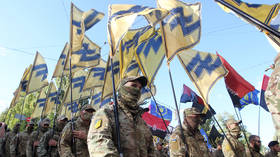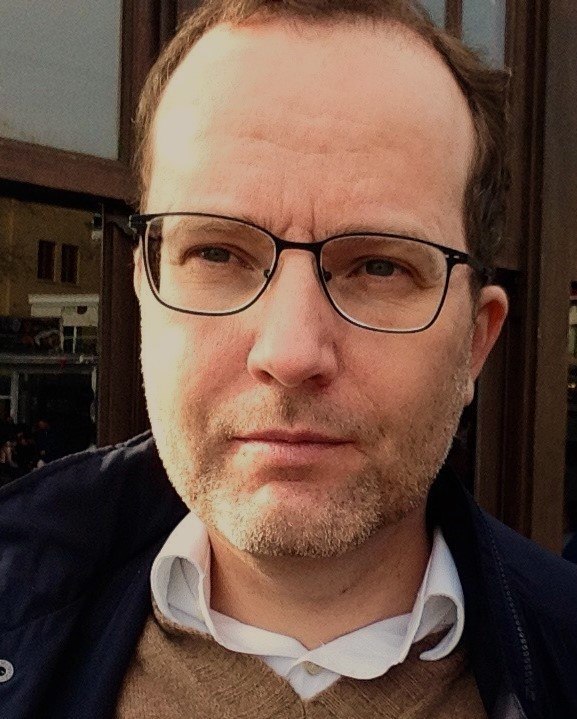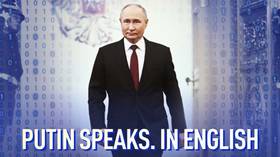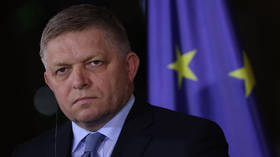Will Kiev’s backers wake up to the reality of its neo-Nazi problem?

Ukraine under the Zelensky regime is a place that is difficult to comprehend. It has a “democracy” but no functioning opposition. It features the usual “vibrant civil society” that every monoglot Western correspondent loves to hang out with in up-to-date coffeeshops, but it has no independent media to speak of.
Last but not least, its far right is either simply not there or marginal and irrelevant, as multiple Western “experts” have assured us, but it also has a veto on an essential, literally vital question of foreign policy, namely if and how to make peace in order to end a devastating war.
That peculiar power of Ukraine’s far right is at the core of a long article recently published by France 24. The head of the Ukrainian parliament’s foreign affairs committee, Aleksandr Merezhko, we learn, has caused heated discussions. Also a member of Zelensky’s Servant of the People party, Merezhko has triggered some of his compatriots with statements he made in the Financial Times.
There, he admitted that Ukraine’s society is “exhausted.” Another (presumably) anonymous “senior official” drew the logical conclusion, namely that “most players want de-escalation here.” That is transparent code for admitting de facto defeat and seeking a compromise peace with Russia. It would, of course, require substantial concessions from Kiev, as Moscow is winning the war against Ukraine and its Western supporters.
In addition, Merezhko openly denounced the “mistake” of, in effect, allowing the American Democrats to use Zelensky’s visit to the US for campaigning purposes, thereby, obviously, alienating the Republicans and especially their already heavily Ukraine-fatigued candidate Donald Trump. It almost looks as if the Ukrainian leader is losing his grip even within his own party.
But, according to France 24, those statements by Merezhko are not what excites the Ukrainian public sphere. Instead, he has ruffled feathers by stating that “ultranationalist,” that is, far-right “elements,” are a “very real threat to the government” and could, in particular, torpedo attempts to negotiate a compromise peace.
“There will,” according to Merezhko, “always be a radical segment of Ukrainian society that will call any negotiation capitulation.” Indeed, it is even worse than that, because that “segment” is getting bigger: “The far right in Ukraine is growing” and constitutes “a danger to democracy.”
It would be easy to ridicule Merezhko’s late and limited insights. For one thing, there is no “democracy” to be endangered in Ukraine. His boss Zelensky, currently over-staying his presidential mandate on dubious grounds, has seen to that, thoroughly. And no, it was not the war that compelled poor Zelensky to become a tyrant. The pronounced authoritarian urges of both the former comedian and his party, which is, in reality, a hybrid between a cult and a ruthless political machine, date back to at least 2021, well before the large-scale escalation of February 2022.
Secondly, for those not brainwashed by inane Ukrainian and Western propaganda, it has always been obvious that the Ukrainian far right is real, powerful, and very dangerous. Welcome to the club, Aleksandr.
However, there are aspects of Merezhko’s moment of truth that deserve serious attention, if not, perhaps, in ways he would find congenial. First, since the West committed the severe error of adopting Ukraine as its proxy against Russia, Ukrainian and Western media and so-called experts have run what has amounted to a campaign of denial about Ukraine’s far right. For more than two years now, that crude information-war effort has managed to misrepresent Ukrainian formations who proudly sport sun wheels, Wehrmacht crosses, and SS runes as nothing but very committed patriots who may, perhaps, have regrettably bad taste in choosing their tattoos.
Indeed, one of the worst effects of the Western proxy war against Russia through and in Ukraine has been a massive and successful “normalizing” of the far right in general. The deal at the bottom of this abysmal operation is simple: If you only hate Russia and Russians enough, you can sport a swastika or some other idiotic rune again, go on about saving the “white race,” and, of course, kill for the West. And, bonus point, the West will make sure everyone understands that you are, really, just a very intense patriot, democrat, and member of civil society. In short, a very fine specimen of all those values that the West is so extraordinarily proud of, while it dishes out war and genocide to the “rest.”
Obviously, things got more elaborate. There was a whole menu of implausible and inconsistent narratives of denial, sanitizing, and downplaying to choose from. “The Ukrainian far right exists, but it is so marginal it might as well not;” “there used to be a Ukrainian far right – like, yesterday, really – but they have all magically depoliticized themselves;” “you cannot mention the Ukrainian far right, because every country has a far right;” “you must understand they love Nazi symbols because they only mean to irritate the Russians;” “those symbols look really Nazi, but they are not because that’s just a rune from the Eddas or, maybe, even The Lord of the Rings;” “their greeting is literally that of a fascist and genocidal World War II nationalist movement, but when they use it now, they just mean to say ‘Gesundheit!’;” “they just can’t stop renaming streets and squares after World War II mass murderers, anti-Semites, and Nazi collaborators, but all they have in mind is good clean patriotism for the whole family;” “their great idol Stepan Bandera wasn’t a fascist killer (spoiler: he was) but a freedom fighter” or, for the very sophisticated, “yes, Stepan Bandera was a fascist, but that doesn’t matter, because they think of him as a cross between Gandhi and Bambi.” And, of course, “it’s all just Russian propaganda.”
And now, all of a sudden, it turns out that the far right is real, strong, and capable of preventing peace. Indeed, far-right military commanders lost no time proving Merezhko’s point: One, from the Third Assault Brigade – that is, the far-right “Azov” unit under another name – publicly called the parliamentarian a “far-left coward.” Another irate officer confirmed that for him, negotiations “on Russia’s conditions” amount to capitulation, while the right “are the basis of the country’s security.”
How did this happen? How did Ukraine end up with a heavily armed, extremely vocal, and politically bossy far right? Apart from the West, its politicians, “experts,” and mainstream media, it was, of course, the Zelensky regime itself that fostered this Frankenstein force. And again, as Zelensky’s authoritarianism, this alliance-building between his regime and the far right clearly antedates the military escalation of 2022. From the cover-up of the Odessa Trade Union House massacre in 2014, via the normalization of “Azov,” to deploying neo-Nazis who had to flee Russia as auxiliaries, Zelensky has a sterling record of proactively teaming up with the far right. The collaboration is so intense, it is impossible to say where the regime ends and its far-right allies begin.
That is the bitter irony of Merezhko’s complaint: It is his boss and his regime who have sold out Ukraine not only to friends from hell in the West, but also to a domestic far right that was bad enough before Zelensky but has become a true monster of ambitions and capacities under him. We have heard much criticism of Russia’s war aim of “denazifying” Ukraine. But what if the real problem we should have paid attention to is how the Zelensky regime has done its best to nazify it?
Now, as the war is about to be lost, this far right will not simply go away. One of its units has long called itself Freikorps. The original Freikorps were, of course, German proto-Nazis whose terror was a postwar response to the country’s defeat in World War I. If Ukraine’s postwar as well will be blighted, among other things, by a far right out for revanche, Ukrainians should blame their own wartime regime and its Western sponsors.
The statements, views and opinions expressed in this column are solely those of the author and do not necessarily represent those of RT.
















